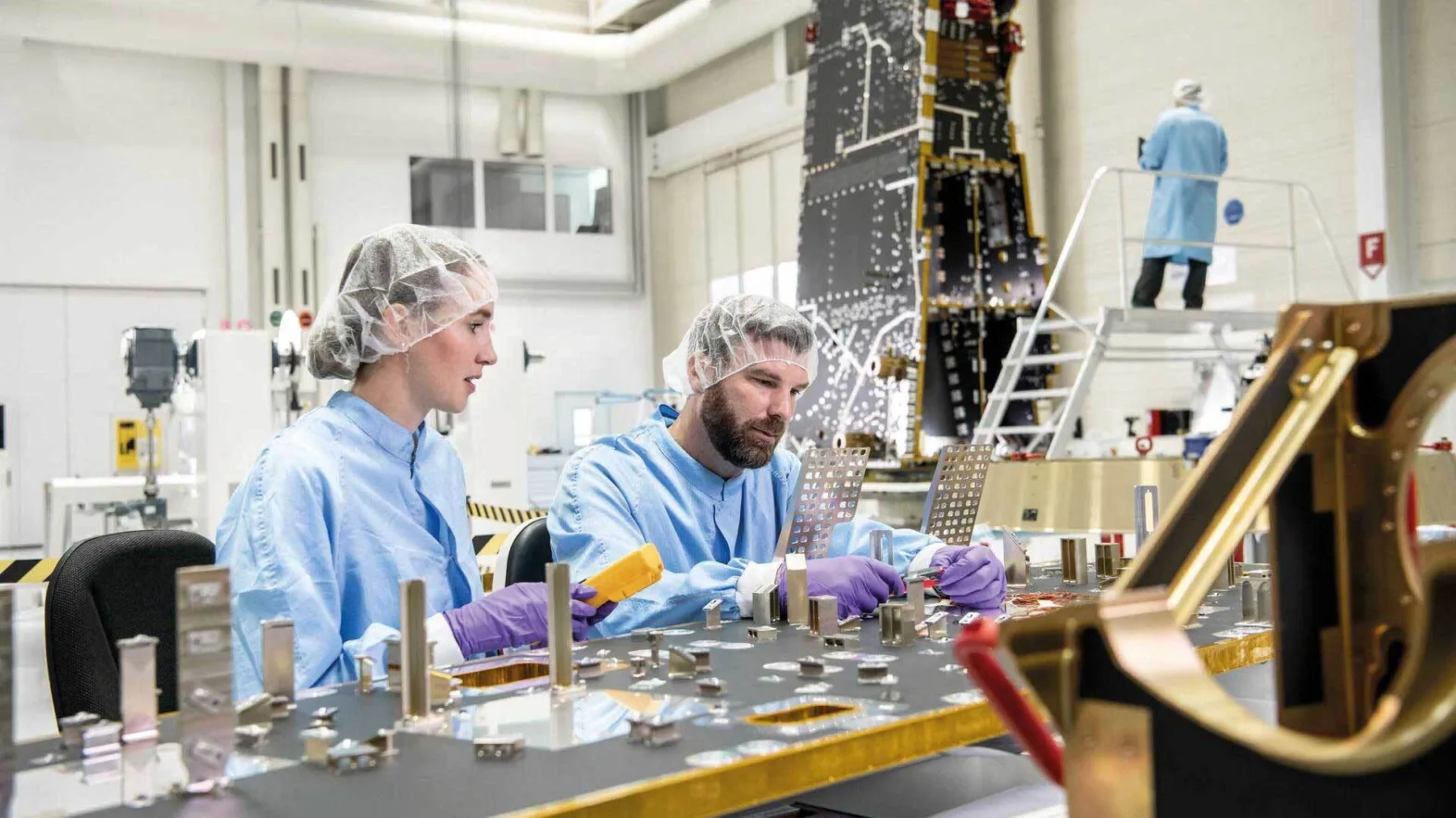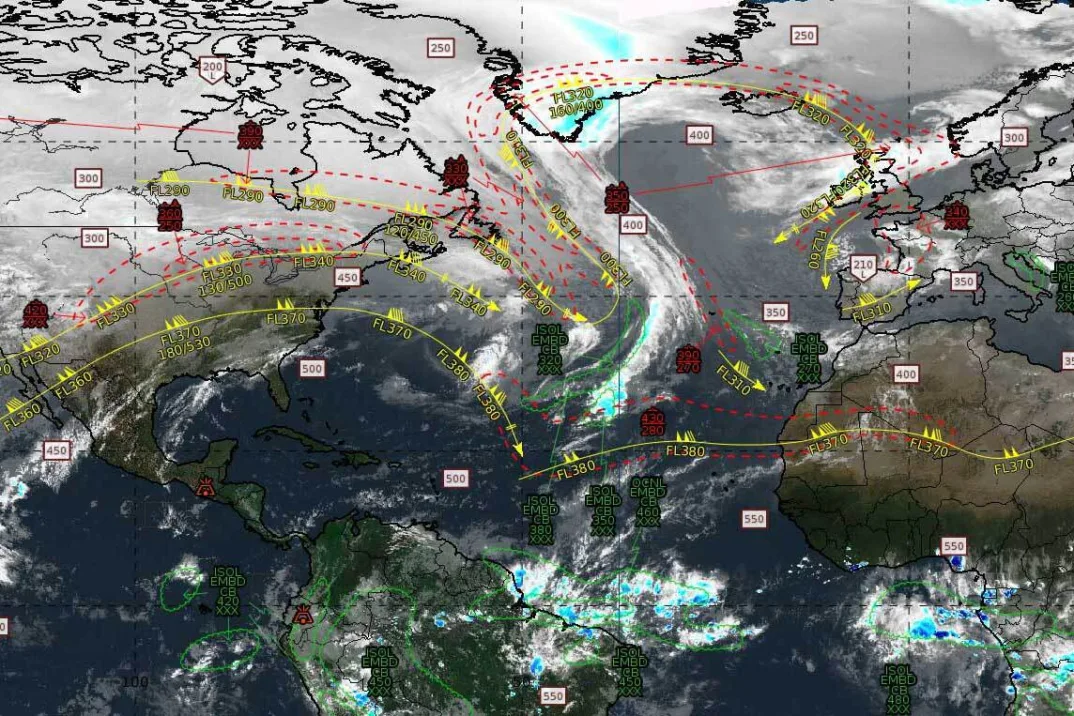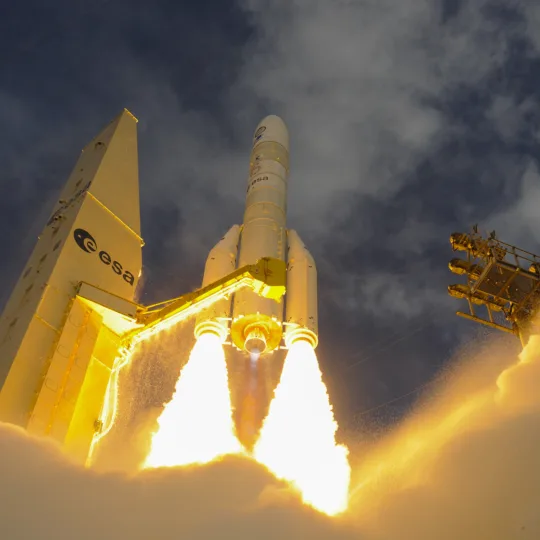Ambitious Switzerland in space
The Confederation invests more than CHF 300 million every year in space activities. They contribute significantly to Switzerland’s prosperity and security. With its 2023 Space Policy, the Federal Council has reaffirmed its commitment to space activities and highlighted new priorities.

We all use satellite applications in our everyday lives. They underpin indispensable services used in communication, navigation and in weather-forecast. They help understand and mitigate the effects of environmental and climate change, drive digitalisation and improve our safety.
Technological developments have made it possible to lower the costs of launching payloads into space and to offer new services via satellite constellations. Worldwide, both the public and private sectors are increasingly investing in space activities. This is opening up numerous opportunities that are being harnessed in the form of technologies, new projects, entrepreneurial initiatives and cutting-edge services. However, this is also bringing challenges with regard to sustainability in space. Space debris, for example, is a growing problem with an increasing number of decommissioned space objects remaining in the Earth’s orbit.
Active role of the state in space
Rapid developments are not only evident in technology and its use, but also in society’s growing dependency on space infrastructures. Geopolitical tensions and unilateralism also impact the space sector. As security and defence concerns intensify, space is developing into an operational domain in its own right.
Despite increasing privatisation and commercialisation, space continues to be primarily the purview of the state, particularly with regard to infrastructures and regulation. Commercialisation should therefore be understood as a leaner approach to state procurement and as transferring some risk from the state to companies. Governments are ramping up their investments and establishing trade barriers; creating an advantage over foreign competitors for their national stakeholders and helping them to secure institutional and private contracts from foreign countries. This is a similar approach to that used in the internet industry, which has enabled tech giants to establish quasi-monopolies. Against this backdrop, Europe and Switzerland have to reposition themselves, not only to preserve autonomous access to space but also to ensure access data and services from space-based infrastructures.

2023 Space Policy
In April 2023, the Federal Council adopted the 2023 Space Policy, updating Switzerland’s 2008 space policy. An evaluation of the 2008 space policy to date has shown that many aspects of this policy have helped Switzerland to position itself favourably in terms of space activities. Switzerland is renowned for its scientific excellence as well as for its innovative companies that create employment, providing high-quality jobs for engineers, scientists and other professionals from various fields.
In order to achieve its space policy goals, the Federal Council aims to intensify international cooperation in Europe and globally. As a founding member of the European Space Agency (ESA), Switzerland has always been a space nation. It also participates in the European Organisation for the Exploitation of Meteorological Satellites (EUMETSAT) and in satellite navigation under the European Union (EU) space programme. At multilateral level, Switzerland plays an active role in various bodies of the UN, the International Telecommunication Union (ITU) and the EU/ESA Space Council.
European Space Agency (ESA)
- Founding year: 1975 with Switzerland as a founding member
- Members: Intergovernmental organisation with 22 Member states
- Over 60 programmes in all areas of space activities
- 2023 budget: EUR 7.08 billion
- Switzerland's 2023 contribution : CHF 196.1 million

Aims and strategic priorities of the 2023 Space Policy
The Federal Council wants to build on these strengths and respond to the new opportunities and challenges of space. It has defined its vision for the coming years as follows:
‘Switzerland’s endeavours in space will:
- Contribute to the quality of life and security of citizens by making full use of the possibilities created by space activities;
- push the frontiers of science and technology by promoting excellence and innovation, which will give Swiss players a competitive edge;
- enable future generations to benefit fully from the opportunities provided by space activities.
Together with its partners, Switzerland will shape European and international space activities as well as global space governance, and pursue its space policy objectives in a way that is open, reliable and of the highest quality.’ From these aims, the Federal Council has derived three strategic priorities, which the relevant departments will implement in their respective areas of responsibility:
- Access and resiliency through targeted programme participation, contributions to support Switzerland’s capacity to act, and a commitment to the sustainable and responsible use of outer space;
- Competitiveness and relevance through excellence in science and competitive companies;
- Partnership and reliability in international cooperation and to support Swiss industrial and scientific sectors and user groups.
And what does SERI do?
Universities, research institutes and innovative industry stakeholders contribute considerable scientific and technical expertise to space missions, especially to those of ESA. In doing so, they directly encourage support for research and innovation in this field. The programmes and projects are financed through specific support mechanisms and budget allocations set out in the Federal Council’s four-year Dispatch on the Promotion of Education, Research and Innovation (ERI Dispatch). The latter enables the Federal Council to pursue its objective of positioning Switzerland as a leading international location for specialised and innovative aerospace companies.
Switzerland is actively involved in shaping the European governance of space activities, with its core focus being cooperation with European partners. SERI also advocates an autonomous and strong Europe within ESA. From July 2023, Switzerland chairs the ESA Council at delegate level through Renato Krpoun, Head of the Space Office at SERI. The ESA Council decides on the activities, the programme and the budget of the space agency. It is comprised of Member State representatives who meet as needed either at delegation or ministerial level. SERI thus helps to ensure that Switzerland continues to be valued as a well-connected and reliable stakeholder.
Switzerland is actively involved in shaping the European governance of space activities, with its core focus being cooperation with European partners.
Draft law on space activities
The Federal Council has formulated its goals with regard to a national legal framework for activities in space in its 2023 Space Policy. The Federal Department of Economic Affairs, Education and Research (EAER) – specifically SERI – is currently tasked with preparing a law on space activities for consultation. The new federal act will incorporate the UN outer space treaties in national legislation. This will create a solid legal framework for Swiss activities in space, which in future will be subject to authorisation and supervision. The aim of the legal framework is to provide legal certainty and ensure the sustainability of Switzerland’s activities in space. It is also intended to maintain and improve Switzerland’s appeal as a business location and enhance the competitiveness of the space industry.
Contact
Author



